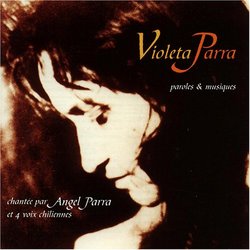| All Artists: Angel Parra Title: Songs of Violetta Parra Members Wishing: 0 Total Copies: 0 Label: Last Call Records Release Date: 9/9/1997 Genres: International Music, Pop, Latin Music Styles: South & Central America, Chile, Easy Listening Number of Discs: 1 SwapaCD Credits: 1 UPC: 3383001207829 |
Search - Angel Parra :: Songs of Violetta Parra
 | Angel Parra Songs of Violetta Parra Genres: International Music, Pop, Latin Music
|
Larger Image |
CD Details |
CD ReviewsThe grandmother of protest singers A R | Israel | 07/26/2000 (5 out of 5 stars) "Violetta Parra was singing for her people, for her beliefs and for her political standing a decade before Bob Dylan.Her songs range from the fight for freedom of opinion and speech (La Carta) to her personal life (Gracias a la Vida), always sung in a way that reaches out form her heart to the hearts of her listeners.She belongs in the hall of fame of artists who were never afraid to stand and voice what they believe in, fight for it, when needed, and even pay the personal price that goes with these.This CD is a magnificent example of Violetta's enchanting work." Una excelente selección del trabajo de Violeta Parra German Mollo Aguila | Santiago, Región Metropolitana Chile | 06/18/2000 (5 out of 5 stars) "Las canciones de Violeta Parra son la base de la música chilena, sin ella, no hay origen, no hay rescate de las raíces. Sin su final, sin su suicidio, no hay historia para su tragedia, no hay futuro sin su pasado. Violeta, nombre de flor para una belleza que murió trágicamente. Pero su canto es la base de todo, o de todos, de todos." Re: Who is Angel Parra? P. Micocci | Houston, TX USA | 10/31/2004 (4 out of 5 stars) "Firstly, I agree with another reviewer that these are perhaps not the best interpretations; for those, listen to Violeta herself or to her daughter Isabel.
Secondly, Angel Parra is Violeta's son, the one who, along with Isabel and their mother, opened La Pena de los Parra in Santiago in the mid 1960s, the veritable center of the counter-culture of Chile in those days. Angel's style is somewhat different than either Isabel's or Violeta's, perhaps because as a rebelious youth, he was more interested in the music of the Argentinian Atahualpa Yupanqui than in his mother's music. Also, Violeta wrote and recorded much of her own music in France during the years she lived there while her children were back in Chile. So all in all, no, Angel Parra is not trying to make a buck off his mother's name; if anything, perhaps he's atoning for the regrets that many of his generation felt after Violeta's suicide that they had not appreciated her more while she was alive. Perhaps Angel's interpretations of his mother's songs are not the best, but his own songs are very fine in their own right." |

 Track Listings (18) - Disc #1
Track Listings (18) - Disc #1